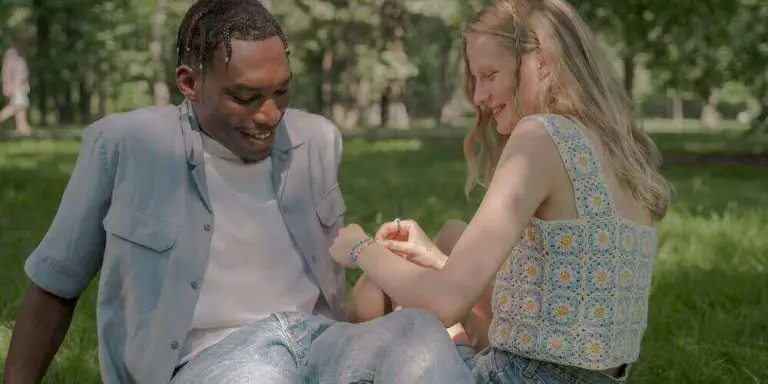
In this article, we’ll learn about the power of gratitude in relationships for stronger bonds.
Introduction
In today’s fast-paced and often stressful world, it’s easy to overlook the power of gratitude in our relationships.
However, expressing gratitude not only benefits the individuals involved but also strengthens the bond between them.
In this article, we will explore the profound impact that gratitude can have on relationships and how it can improve our overall well-being.
The Benefits of Gratitude
1. Enhanced Communication: Expressing gratitude fosters open and positive communication between individuals. When we express our appreciation for others, it encourages them to reciprocate and creates a nurturing environment for deeper connection and understanding.
2. Increased Empathy: Gratitude cultivates empathy, allowing us to put ourselves in someone else’s shoes and recognize their efforts and contributions. This empathy forms the foundation for compassionate and caring relationships.
3. Improved Trust: Gratitude builds trust by acknowledging and valuing the actions and qualities of others. When we express gratitude, we create a sense of safety and appreciation, strengthening the trust between individuals.
4. Positive Atmosphere: Gratitude creates a positive atmosphere in relationships. It shifts the focus from what is lacking to what is present, fostering optimism, and creating a nurturing space for growth and happiness.
Cultivating Gratitude in Relationships
Practicing Daily Gratitude
One effective way to cultivate gratitude in relationships is through daily practices. Here are some suggestions:
1. Gratitude Journal: Maintain a gratitude journal where you write down things you are grateful for each day. Share this practice with your partner or loved ones and encourage them to do the same.
2. Express Appreciation: Take the time to express your gratitude verbally or through small gestures of appreciation. Simple acts like saying “thank you” or leaving a thoughtful note can go a long way in strengthening your relationships.
3. Celebrate Achievements: Celebrate each other’s achievements and milestones. Acknowledge the hard work and dedication put into reaching goals, and express gratitude for the support received along the way.
Cultivating a Mindset of Gratitude
1. Shift Perspective: Train your mind to focus on the positive aspects of your relationships. Instead of dwelling on flaws or shortcomings, consciously choose to appreciate and be grateful for the strengths and qualities of others.
2. Practice Empathy: Put yourself in the other person’s shoes and recognize their efforts and challenges. Develop a genuine understanding of their perspective, and express gratitude for their presence and contributions to your life.
3. Forgiveness and Understanding: Embrace forgiveness and understanding in your relationships. Let go of grudges and practice gratitude for the opportunities to grow and learn together.
The Impact of Gratitude on Relationship Satisfaction
Gratitude plays a significant role in enhancing relationship satisfaction. When individuals feel appreciated and valued, their overall satisfaction with the relationship increases.
Here are some ways gratitude positively impacts relationship satisfaction:
Increased Emotional Connection
Expressing gratitude fosters a deeper emotional connection between individuals. When we express appreciation for our partner or loved ones, it creates a sense of emotional intimacy and strengthens the bond between us.
It helps us feel seen, understood, and valued, leading to greater relationship satisfaction.
Strengthened Resilience
Gratitude also strengthens resilience in relationships. When challenges arise, expressing gratitude helps to navigate those difficult times with a positive mindset.
It reminds us of the support and love we receive, giving us the strength to overcome obstacles together.
By acknowledging the positives amidst the negatives, gratitude empowers relationships to endure and thrive.
Enhanced Mutual Support
Gratitude encourages mutual support and reciprocity within relationships. When we express gratitude for the support we receive from our partner, it fosters a sense of teamwork and encourages both individuals to continue being supportive.
This mutual support becomes a pillar of the relationship, nurturing a healthy and fulfilling bond.
The Role of Gratitude in Conflict Resolution
Conflict is inevitable in any relationship, but gratitude can play a vital role in resolving conflicts and maintaining harmony.
Here’s how gratitude contributes to conflict resolution:
Perspective Shifting
Expressing gratitude helps us shift our perspective during conflicts. Instead of solely focusing on the negative aspects, gratitude allows us to acknowledge the positive qualities and intentions of the other person.
This shift in perspective fosters understanding, empathy, and compassion, paving the way for effective conflict resolution.
Building Bridges
Gratitude acts as a bridge builder during conflicts, promoting open communication and understanding.
When we express gratitude for the efforts and intentions of the other person, it creates a safe space for dialogue and negotiation.
It encourages both parties to find common ground and work towards a mutually beneficial resolution.
Promoting Forgiveness
Gratitude promotes forgiveness by reminding us of the positive aspects of the relationship. When we express gratitude, it becomes easier to let go of resentment and grudges.
It allows us to focus on the strengths of the relationship and encourages forgiveness, paving the way for healing and reconciliation.
Conclusion
In conclusion, gratitude holds immense power in strengthening relationships. By practicing daily gratitude and cultivating a mindset of appreciation, we can enhance communication, foster empathy, build trust, and create a positive atmosphere. Let us remember that gratitude is not just a fleeting emotion but a way of life that can transform our relationships for the better.
Frequently Asked Questions
Q: How does gratitude impact relationships?
A: Gratitude enhances communication, increases empathy, improves trust, and creates a positive atmosphere, all of which contribute to stronger relationships.
Q: What are some practical ways to cultivate gratitude in relationships?
A: Keeping a gratitude journal, expressing appreciation, celebrating achievements, and shifting perspective are effective ways to cultivate gratitude in relationships.
Q: Can gratitude help in resolving conflicts?
A: Yes, expressing gratitude can help in resolving conflicts by fostering understanding, empathy, and creating a more positive and forgiving environment.
Q: Is gratitude beneficial in all types of relationships?
A: Yes, gratitude can be beneficial in all types of relationships, including friendships, romantic partnerships, family relationships, and professional connections.
Q: How can I incorporate gratitude into my daily life?
A: You can incorporate gratitude into your daily life by making it a habit to express appreciation, keeping a gratitude journal, and consciously focusing on the positive aspects of your relationships.



